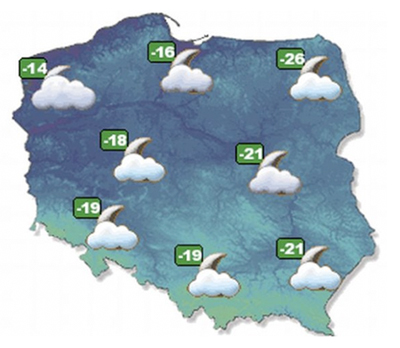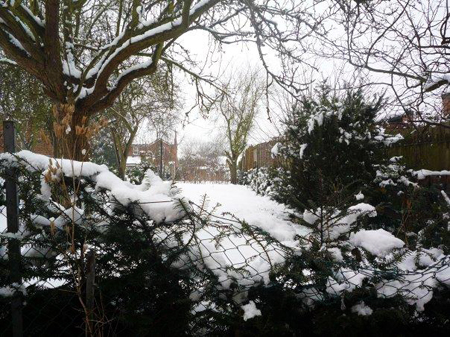Guest Post – Evil Winter! (“Zima Zła”) Posted by Anna on Jan 25, 2010 in Culture, Vocabulary
Today we have a new guest post by a new guest blogger – Ms. Anglopole.
Ms. Anglopole is Polish but lives with her husband and kids in the UK. She blogs about her Anglopolish life at Anglopole’s Ponglish World.
OK, Ms. Anglopole, the floor (or rather – the blog) is yours today! Take it away.
A few weeks before Christmas the British media treated us with scary news: there would be heavy snowfalls (opady śniegu) practically everywhere in the British Isles! Yeah, yeah, you’ve guessed right – for most immigrants (emigranci) from the Central and Eastern Europe this news was far from frightening, and actually, the omnipresent British ‘snow panic’ was getting to be really annoying.
Surprisingly the weather forecast (prognoza pogody) was correct on that occasion and we actually had a month of real winter, which reminded me of Polish winters (polskie zimy) and how harsh they can be. I am sure many of my countrymen living in the UK welcomed the freezing temperatures (mrozy), blizzards (zamiecie), snowdrifts (zaspy śnieżne) and picture postcard landscapes (krajobrazy jak z obrazka) as a reminder of Poland in winter. Those homesick for our homeland have felt more at home in the UK this winter, that’s for sure.

I am not a great fan of cold winters and so the ‘big freeze’ we experienced last year and at the beginning of 2010, for me personally, was more of a survival camp (obóz przetrwania) than anything else.
First of all, the fact that nothing whatsoever was done to clear the local roads and pavements (sidewalks) from snow was a major hazard (zagrożenie) for anyone venturing out of their house. On those snowy days I couldn’t stop thinking about winter tyres (opony zimowe) which are a necessity (konieczność) in Poland and here are rather uncommon.
Also I so wished I had a shovel (szufla) to clear the snow at least around our house. To transport the kids around people needed sleds (sanie) and we got one as well. Ironically, on the day a friend of ours gave us a sled for our children, the snow began to thaw (topnieć) and it hasn’t snowed again since. The white blankets covering the fields have disappeared and all the snowmen (bałwany) built by excited kids have melted away (roztopiły się).
At the moment, the winter here is more or less as it usually is in the UK – rainy (deszczowa, yes, “deszczowa”, because in Polish “winter” – “zima” is a feminine noun), windy (wietrzna) and chilly (chłodna). I am relieved, frankly speaking. I also feel for all my friends back in Poland as winter there seems to be truly Siberian and can be described nicely by this paragraph from Maria Konopnicka’s poem ‘Zła Zima’ (Evil Winter):
“Hu! Hu! Ha! Nasza zima zła!
Szczypie w nosy, szczypie w uszy
Mroźnym śniegiem w oczy prószy,
Wichrem w polu gna!
Nasza zima zła!”
It looks like the global warming (globalne ocieplenie) in Europe has been more like a global freezing! 😉
Oh, spring, where art thou?! Wiosno, gdzie jesteś?!
Thank you so much Ms. Anglopole! You have no idea how happy I am that you decided to write about winter. Personally, I hate winters. I’d rather pretend they didn’t exist at all. So, needless to say, I am very glad you picked this “frosty” topic for your guest post.

Build vocabulary, practice pronunciation, and more with Transparent Language Online. Available anytime, anywhere, on any device.





Comments:
Mary:
My husband has loved the weather – he says that it feels like a proper winter.
He (and every other Pole in the UK) has not stopped talking about getting winter tyres and how it wouldn’t be a problem if people had to chang their tyres!
Also, I get the stories about the janitors responsible for the pavement outside their building.
We spent a long time looking for a shovel (i was given detailed instructions into the difference between a shovel and a spade) to no avail – there were no spades or shovels to be fine.
One thing that i can say that cold zimno is onomatopoeia in my opinion. You can’t mistake the meaning because it sounds cold.
It was good to read something from old blighty!
Michael:
You said it yourself,
First of all, the fact that nothing whatsoever was done to clear the local roads and pavements (sidewalks) from snow was a major hazard (zagrożenie) for anyone venturing out of their house.
This is why show is a big deal in Britain and news.
Anglopole:
The good news is that we’re having proper English winter now = no snow 🙂 [at least in the South East]
… and the old Blighty seems to be back to normal! Thanks for your your comments! Indeed, the snowfalls would be much more bearable if the local authorities were ready to put more effort in dealing with all the hazards related to the ‘big freeze’!
James:
Why is it ‘ wiosno gdzie jesteś’ and not ‘ wiosna gdzie jesteś ‘ ?
Anna Ikeda:
Hi James!
because it’s yet another one of Polish cases – vocative this time. 🙂
jamie:
Po raz kolejny, dziecko wydaje się być jedynym ocalałym z katastrofy samolotu przerażające. To już trzeci w http://www.tvdrawing.com ciągu ostatnich 12 miesięcy. zbieg okoliczności? Myślę, że nie. Po jego nieszczęście, dwa razy mogą być uznane za przypadkowe, trzy razy … wynagrodzenia kiddies uwagę, duch stara się nauczyć nas czegoś.
Hej, były to prawe skrzydło geniuszy próbuje za to winić Obowma lub guvmint? Witam, są faceci snu późno? kretyni.